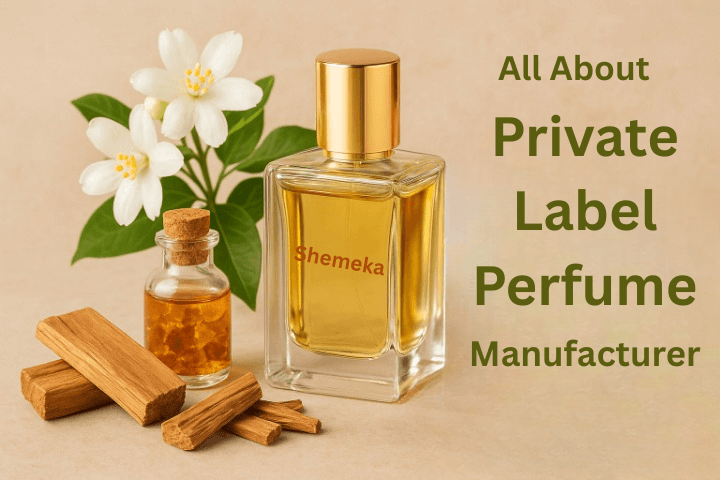The perfume industry is no longer just for luxury giants like Chanel or Dior. Today, thanks to private label perfume manufacturing, even small entrepreneurs can enter the fragrance market with their own unique scents and brand identity. Whether you’re a beauty influencer, a boutique owner, or someone with a passion for perfume, private label manufacturing gives you a way to build your own perfume brand without starting from scratch.
But before you jump in, there are several key things you need to know. From understanding how the process works to choosing the right manufacturer and marketing your final product, here’s everything you should consider before starting your private label perfume journey.
The Heart behind Private Label Perfume Manufacturing?
Private label perfume manufacturing is when a third-party company produces perfumes that are branded under your name. These companies already have the infrastructure, ingredients, and expertise to create high-quality fragrances however you have to simply provide your brand name, design preferences, and vision — they handle the rest.
You get the final product in your branding, and it looks like it’s 100% your creation. The good part is that You don’t need a lab, a chemist, heavy machineries, or crores of rupees to get started.
Why People Are Choosing Manufacturing from Private label companies
Here are a few reasons why private label perfume manufacturing is getting popular, especially in countries like India:
- Low Entry Barrier: You don’t need years of experience or large capital to start.
- Speed to Market: You can launch your brand in as little as 4-6 weeks.
- Customization Options: You can choose your fragrance notes, bottle style, and packaging design.
- Brand Building: You get to build your own brand identity, which increases customer loyalty.
- Maintain Focus: Instead of taking tension about procurements, formulations, licenses, manufacturing hazels etc, You can now focus on the marketing and Brand building activities. This is increase the chances of success as you completely focused.
Steps to start your perfume brand with third party manufacturing.
Step 1: Know Your Brand Vision
Before talking to any manufacturer, be crystal clear about your brand identity:
- Who is your target audience? (Luxury buyers, everyday users, Gen-Z crowd, etc.)
- What kind of fragrances do you want to offer? (Woody, floral, fruity, oriental, oud-based?)
- What’s your brand story? (Eco-friendly, Traditional Indian roots, Modern luxury)
- What will be your price range?
This vision will help you and your manufacturer stay aligned throughout the process.
Step 2: Choose the Right Private Label Manufacturer
This is the most important step. A good manufacturer can make or break your own brand. Here’s what you should look for:
- Experience: Do they specialize in perfumes or just general cosmetics?
- Minimum Order Quantity (MOQ): Some companies require just 500 units to start, others might ask for 10,000.
- Fragrance Library: Do they offer a wide variety of scent options?
- Customization Flexibility: Can they help you develop a signature scent or only offer ready-made ones?
- Certifications: Look for ISO, GMP, cruelty-free etc.
- Client Reviews & Portfolio: Check if they’ve worked with known brands before.
In India, companies like Shemeka Industry is one of the best private label perfume manufacturing company. Shemeka is known for trustworthiness, quality and commitment, on time delivery, honesty, reliable business partner and customer satisfaction. They also have a wide variety of more than 1500 fragrances in their catalog.
Step 3: Understand the Product Development Process
Here’s a simplified breakdown of how the manufacturing journey typically goes:
1. Consultation & Scent Selection
You discuss your vision and choose from existing scent profiles or create a custom blend.
2. Packaging & Bottle Design
Manufacturers usually offer a catalog of bottle shapes. You can choose caps, bottle Colours, labels, and box design. Some even allow laser engraving or gold foiling for luxury looks.
3. Sampling
Before production, they will send you a few samples. Always test the scent, longevity, and spray quality.
4. Final Approval
Once you’re satisfied, you give them the green light to start bulk production.
5. Production & Delivery
Depending on the MOQ, the production can take 2–6 weeks. Products are then shipped to your address or warehouse. Always start with atleast 3-6 months inventory to begin with, as next order will take time to reach you.
Step 4: Legal and Compliance Matters
While manufacturers take care of most legalities, you should still know the basics:
- Trademark Your Brand: To protect your brand name and logo.
- Labeling Laws: Your product labels must include ingredients, batch number, expiry, and manufacturing date.
- Import/Export Certifications: If you plan to sell globally, ensure your products meet local regulations.
- GST and Business Registration: Set up your business as a sole proprietorship or private limited company with GST registration.
Step 5: Pricing Strategy
Perfume pricing depends on several factors:
- Bottle & packaging quality
- Ingredients (natural oils cost more than synthetic ones)
- Brand position (mass-market vs. niche luxury)
- Shipping and handling costs
As a rule of thumb, try to keep your cost price at 1/3rd of your selling price, so you can make a decent profit after marketing expenses.
Step 6: Branding and Marketing
A beautiful long lasting perfume won’t sell itself unless it’s backed by strong branding and marketing. Focus on:
- Logo & Brand Colours: Keep it clean, memorable, and consistent.
- Website & E-commerce Setup: Shopify and WooCommerce are good starting points.
- Social Media Presence: Instagram and YouTube work well for perfumes. Influencer collaborations can drive huge traffic.
- Packaging Unboxing Experience: Invest in luxurious unboxing – it adds to perceived value.
- Testimonials & Reviews: Early buyers are your best promoters. Encourage feedback.
Common Mistakes to Avoid
- Ignoring Scent Longevity: A good smell that fades in 15 minutes will ruin your brand.
- Not Testing Packaging: Some bottles leak or sprayers don’t work well. Test before mass production.
- No Storytelling: Your perfume must emotionally connect with customers. Don’t sell just a bottle – sell a mood or lifestyle.
Final Thoughts
Starting a private label perfume brand is a beautiful blend of creativity, business, and personal expression. With the right manufacturing partner and a clear vision, you can launch a product line that not only smells amazing but tells your brand story.
Companies like Shemeka have made it easier than ever to build custom perfumes in all price ranges — from budget-friendly perfumes to premium oud-based fragrances. So, whether you dream of launching a minimalist brand for the youth or a luxury brand rooted in Indian tradition, the opportunity is wide open. All you need is a good nose and great branding.




